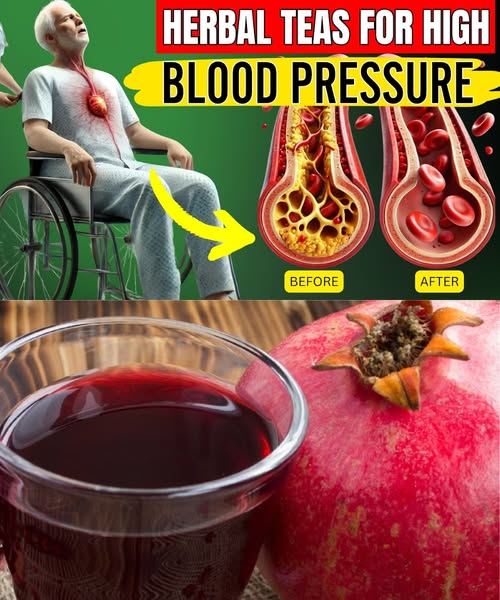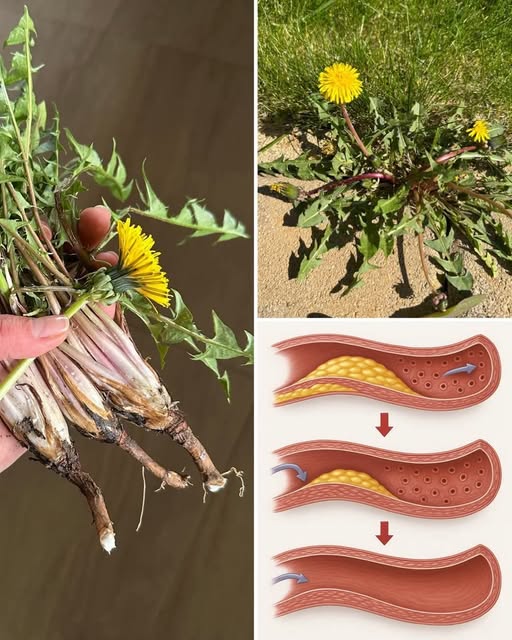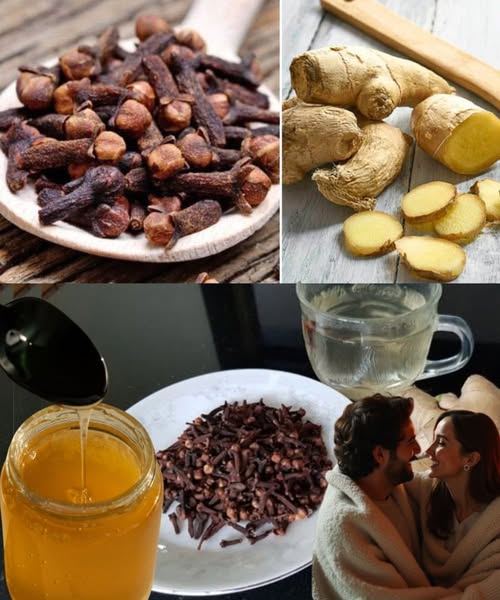Introduction

Is your blood pressure creeping up—and you’re not sure what to do about it? You’re not alone. Millions of people face hypertension and clogged arteries without even realizing that nature offers powerful remedies that have stood the test of time.
While pharmaceutical solutions dominate the headlines, the truth is many doctors never mention simple, natural ways to improve cardiovascular health—like herbal teas. These teas are not only soothing and delicious, but many also carry potent compounds that support healthy blood flow, reduce arterial plaque, and normalize blood pressure.
In this article, we’ll reveal the top 8 scientifically-backed herbal teas that can unclog arteries and lower blood pressure naturally. You’ll learn what makes each tea so powerful, how to prepare it, when to drink it, and which combination works best.
💡 Ready to sip your way to better heart health? Let’s dive in.
Why Herbal Teas Work for Cardiovascular Health
Herbal teas are more than a wellness trend. They are ancient remedies backed by modern science. Their secret lies in plant-based antioxidants, flavonoids, polyphenols, and anti-inflammatory compounds that improve vascular function, reduce LDL cholesterol, and regulate blood pressure.
According to the American Heart Association, lifestyle changes—including dietary interventions—can reduce the risk of heart disease by up to 80%. Herbal teas are one of the easiest and most cost-effective ways to begin this transformation.
1. Hibiscus Tea – The Artery Cleaner
Main Benefit: Lowers blood pressure within weeks
Active Compounds: Anthocyanins, polyphenols
Hibiscus tea is often called a “natural ACE inhibitor” for its ability to dilate blood vessels and reduce systolic blood pressure. According to a study published in the Journal of Nutrition, drinking three cups daily lowered blood pressure by up to 10 points in just six weeks.
How to Use:
- Steep 1–2 teaspoons of dried hibiscus petals in hot water for 5–7 minutes.
- Drink it twice daily, preferably morning and evening.
Pro Tip: Add a squeeze of lemon for enhanced detoxification.
2. Garlic Tea – The Artery Unblocker Doctors Won’t Mention
Main Benefit: Dissolves arterial plaque
Active Compounds: Allicin
Garlic tea might not sound appealing, but it’s a potent vasodilator that lowers LDL (“bad”) cholesterol, reduces triglycerides, and boosts nitric oxide levels.
A 2016 meta-analysis found that garlic supplements reduced blood pressure by an average of 8–10 mm Hg in hypertensive individuals—similar to some medications.
How to Use:
- Boil 2 crushed garlic cloves in 1½ cups of water for 10 minutes.
- Strain and add lemon and honey. Drink once daily on an empty stomach.
3. Green Tea – The Antioxidant King
Main Benefit: Boosts circulation and prevents artery hardening
Active Compounds: Catechins (especially EGCG)
Green tea is rich in epigallocatechin gallate (EGCG), which has been shown to reduce LDL cholesterol and improve endothelial function. It’s one of the most studied herbal teas for cardiovascular protection.
A Japanese study involving over 40,000 participants found that people who drank 5 or more cups of green tea daily had a 26% lower risk of heart disease.
How to Use:
- Steep 1 teaspoon of green tea in hot water for 2–3 minutes.
- Consume 2–3 cups daily, ideally between meals.
4. Turmeric Tea – The Inflammation Fighter
Main Benefit: Reduces arterial inflammation and supports detox
Active Compound: Curcumin
Turmeric tea tackles the root cause of heart disease—inflammation. Curcumin, its main active compound, improves blood flow and prevents oxidative damage to arteries.
A study in Phytotherapy Research showed that curcumin can reduce arterial plaque progression by up to 26% in just a few months.
How to Use:
- Simmer ½ tsp turmeric powder in water for 10 minutes. Add black pepper to enhance absorption.
- Drink daily, especially in the evening.
5. Ginger Tea – The Blood Flow Booster
Main Benefit: Improves circulation and lowers cholesterol
Active Compounds: Gingerol, shogaol
Ginger tea supports cardiovascular health by preventing blood clots, improving blood circulation, and reducing cholesterol levels. It also has mild blood-thinning properties, making it effective in unclogging arteries.
In one study, people who consumed 5 grams of ginger powder daily showed significant reductions in total cholesterol and LDL.
How to Use:
- Grate fresh ginger (1-inch piece) into hot water and steep for 10 minutes.
- Drink 1–2 cups daily, especially after meals.
6. Cinnamon Tea – The Blood Pressure Stabilizer
Main Benefit: Lowers systolic and diastolic blood pressure
Active Compounds: Cinnamaldehyde, antioxidants
Cinnamon tea is excellent for stabilizing blood sugar and improving heart health. A meta-analysis in Nutrition found that cinnamon can reduce systolic blood pressure by 6 mm Hg and diastolic by 3 mm Hg.
Cinnamon also improves lipid profiles, which helps reduce fatty deposits in arteries.
How to Use:
- Boil a cinnamon stick in water for 10 minutes.
- Consume once daily, preferably in the morning.
Caution: Avoid excess cinnamon (especially cassia) due to potential liver toxicity.
7. Hawthorn Tea – The Heart Tonic
Main Benefit: Strengthens heart muscle and improves circulation
Active Compounds: Flavonoids, procyanidins
Used for centuries in traditional European medicine, hawthorn tea enhances blood flow, reduces arterial stiffness, and strengthens heart contractions. It is commonly prescribed in Germany for early-stage heart failure.
A study published in The American Journal of Chinese Medicine noted improvements in cardiac output and reduced symptoms of angina after hawthorn extract consumption.
How to Use:
- Steep 1 tsp of dried hawthorn berries in hot water for 10 minutes.
- Drink once or twice daily, consistently for several weeks.
8. Rooibos Tea – The Stress Reliever for Your Arteries
Main Benefit: Reduces stress-induced blood pressure spikes
Active Compounds: Aspalathin, quercetin
Rooibos is naturally caffeine-free and packed with antioxidants that combat oxidative stress and inflammation. Its calming effects help prevent blood pressure spikes caused by chronic stress—an underrated trigger for hypertension.
Research in Public Health Nutrition showed that regular consumption of rooibos tea reduced angiotensin-converting enzyme (ACE) activity, thereby lowering blood pressure.
How to Use:
- Steep 1 tablespoon of rooibos leaves in hot water for 5 minutes.
- Drink in the evening to support relaxation and recovery.
Frequently Asked Questions
Can herbal teas replace medication?
No. Herbal teas can complement but should not replace prescribed medications unless advised by a physician. Always consult your doctor before making changes to your treatment.
How long until I see results from drinking herbal tea?
Most people notice effects in 2–6 weeks with daily use. Blood pressure readings may improve gradually.
Are there side effects to herbal teas?
In general, they’re safe in moderate amounts. However, excessive intake or combining with certain medications (like blood thinners) may cause interactions. Always check with a healthcare provider.
Is it safe to mix different herbal teas?
Yes, but stick to 2–3 types at a time to monitor your body’s response. Combining hibiscus, ginger, and cinnamon is a great starter mix.
Final Thoughts: Take Charge of Your Heart Health Naturally
High blood pressure and clogged arteries don’t happen overnight—and they won’t disappear overnight either. But by integrating these 8 powerful herbal teas into your daily routine, you take a proactive step toward reversing years of damage naturally and gently.
These teas are not only affordable and accessible, but they also offer a lifetime of cardiovascular benefits when used consistently.
💬 Your body whispers before it screams—start listening today.
🍵 Sip smart. Protect your heart.


